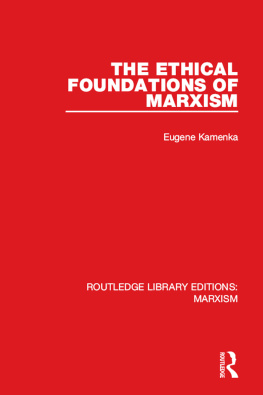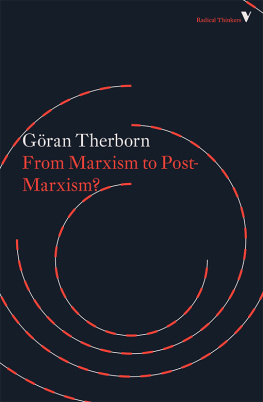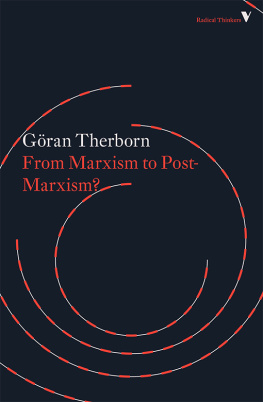Emile Burns - What is Marxism?
Here you can read online Emile Burns - What is Marxism? full text of the book (entire story) in english for free. Download pdf and epub, get meaning, cover and reviews about this ebook. year: 2014, publisher: Marxists Internet Archive, genre: Politics. Description of the work, (preface) as well as reviews are available. Best literature library LitArk.com created for fans of good reading and offers a wide selection of genres:
Romance novel
Science fiction
Adventure
Detective
Science
History
Home and family
Prose
Art
Politics
Computer
Non-fiction
Religion
Business
Children
Humor
Choose a favorite category and find really read worthwhile books. Enjoy immersion in the world of imagination, feel the emotions of the characters or learn something new for yourself, make an fascinating discovery.

- Book:What is Marxism?
- Author:
- Publisher:Marxists Internet Archive
- Genre:
- Year:2014
- Rating:4 / 5
- Favourites:Add to favourites
- Your mark:
- 80
- 1
- 2
- 3
- 4
- 5
What is Marxism?: summary, description and annotation
We offer to read an annotation, description, summary or preface (depends on what the author of the book "What is Marxism?" wrote himself). If you haven't found the necessary information about the book — write in the comments, we will try to find it.
What is Marxism? — read online for free the complete book (whole text) full work
Below is the text of the book, divided by pages. System saving the place of the last page read, allows you to conveniently read the book "What is Marxism?" online for free, without having to search again every time where you left off. Put a bookmark, and you can go to the page where you finished reading at any time.
Font size:
Interval:
Bookmark:
What Is Marxism?
Emile Burns
http://www.marxists.org/archive/burns-emile/1939/what-is-marxism/
Publisher: Marxists Internet Archive
Source: What Is Marxism? by Emile Burns, 63 pp., Registered at G.P.O., Melbourne, for transmission by post as a book. Published by International Bookshop Pty. Ltd. 180 Exhibition Street. Melbourne, C.1, 1945, Richmond Chronicle, Shakespeare Street. Richmond, E.1.;
First published: in 1939, Reprinted in 1943, First Australian edition 1945 (5m.);
Transcribed: by Andy Blunden.
Converted to eBook format by: Semih
Date: February 4, 2014
The publishers of this little volume have no hesitation in stating that this is the best, short exposition of Marxism yet published in the English language. This, however, does not mean that it is a complete work on Marxism. Obviously, the full treatment of any branch of science would require the space of many large volumes. As Marxism embraces the sciences of political-economy, sociology and philosophy, and touches upon every aspect of mans activity from pre-historic times to the present day, a complete understanding of Marxism can be gained only by a study of the writings of Marx, Engels, Lenin, Stalin and others, listed in the bibliography on the back of this booklet.
However, Emile Burns WHAT IS MARXISM?, as an introduction for new students, or as a handy refresher for past students and lecturers, will be found an adequate guide. It is not just another booklet to be read and forgotten. It is a concise outline of Marxism that will repay repeated readings and serious study. New investigators of Marxism will find themselves stimulated to seek more knowledge of the theories of Scientific Socialism, as expounded by Marxists; and every Marxist, no matter what his degree of knowledge, will find within these pages a method of exposition most helpful to the imparting of Marxist theory, whether in the lecture hall, or study group.
Finally, we direct the attention of those coming into contact with Marxism for the first time, through the pages of this booklet, that the only banner-bearers of Marxist theory are the Communist Parties of the various countries; that this Party, alone, gives practical application to these principles ... everywhere and at all times, on the historical conditions for the time being existing ... That the Communists everywhere support revolutionary movements against the existing order of things. And they labour everywhere for the union and agreement of the democratic parties of all countries.
The application of Marxian principles by the architect and builder of the mighty U.S.S.R., The Communist Party of the Soviet Union (Bolshevik), is a lesson in combining theory with practice that must ever be heeded by those who would devote their lives to the emancipation of mankind.
Melbourne, 1945
Marxism is a general theory of the world in which we live, and of human society as a part of that world. It takes its name from Karl Marx (1818-1883), who, together with Friedrich Engels (1820-1895), worked out the theory during the middle and latter part of last century.
They set out to discover why human society is what it is, why it changes, and what further changes are in store for mankind. Their studies led them to the conclusion that these changes like the changes in external nature are not accidental, but follow certain laws. This fact makes it possible to work out a scientific theory of society, based on the actual experience of men, as opposed to the vague notions about society which used to be (and still are) put forward notions associated with religious beliefs, race and hero-worship, personal inclinations or utopian dreams.
Marx applied this general idea to the society in which he lived mainly capitalist Britain and worked out the economic theory of capitalism by which he is most widely known. But he always insisted that his economic theories could not be separated from his historical and social theories. Profits and wages can be studied up to a certain point as purely economic problems; but the student who sets out to study real life and not abstractions soon realises that profits and wages can only be fully understood when employers and workers are brought into the picture; and these in turn lead on to a study of the historical stage in which they live.
The scientific approach to the development of society is based, like all science, on experience, on the facts of history and of the world around us. Therefore Marxism is not a completed, finished theory. As history unfolds, as man gathers more experience, Marxism is constantly being developed and applied to the new facts that have come to light. The most outstanding of these developments, since the death of Marx and Engels, have been made by V. I. Lenin (1870-1924), and by Joseph Stalin, who has continued Lenins work in building up the new socialist society in Russia.
The result of the scientific approach to the study of society is knowledge that can be used to change society, just as all scientific knowledge can be used to change the external world. But it also makes clear that the general laws which govern the movement of society are of the same pattern as the laws of the external world. These laws which hold good universally, both for men and things, make up what may be called the Marxist philosophy or view of the world.
The following chapters deal with Marxist theory in the fields which are of most immediate interest. It is essential, however, for the student to realise from the outset that Marxism does not claim recognition because it is based on abstract moral principles, but because it is true. And because it is true, it can be and should be used to rid humanity for ever of the evils and misery which afflict so many in the world today, and to help men and women forward to full development in a higher form of society.
The history of mankind is usually presented in the form of a record of wars between nations and the exploits of individual monarchs, generals or statesmen. Sometimes the motives of these individuals are described in a purely personal way their ambitions led them to conquer territory, or their moral or immoral outlook caused them to adopt certain policies. Sometimes they are described as acting for the sake of the countrys honour or prestige, or from some motive of religion.
Marxism is not satisfied with such an approach to history.
In the first place, it considers that the real science of history must deal with the peoples, and only with individuals in so far as they represent something much wider than themselves some movement of the people.
For example, Cromwell is important not because of his own outlook and individual actions, but because he played an important part in the movement of a section of the English people against the old order. He and his movement broke down the barriers of feudalism, and opened the way for the widespread development of capitalism in Britain. What matters is not the record of his battles and his religious outlook and intrigues. But the study of Cromwells place in the development of British production and distribution, the understanding of why, at that period and in Britain, the struggle developed against the feudal monarchy; the study of the changes actually brought about in that period these are important; they are the basis of a science of history. By using the knowledge derived from such a study (along with the study of other periods and of other peoples), it is possible to draw up general theories laws of the development of society, which are just as real as the laws of chemistry or any other science. And once we know these laws we can make use of them, just as we can make use of any scientific law we can not only foretell what is likely to happen, but can
Next pageFont size:
Interval:
Bookmark:
Similar books «What is Marxism?»
Look at similar books to What is Marxism?. We have selected literature similar in name and meaning in the hope of providing readers with more options to find new, interesting, not yet read works.
Discussion, reviews of the book What is Marxism? and just readers' own opinions. Leave your comments, write what you think about the work, its meaning or the main characters. Specify what exactly you liked and what you didn't like, and why you think so.










